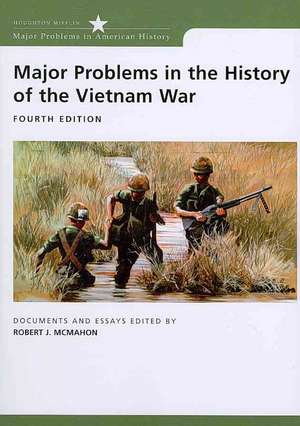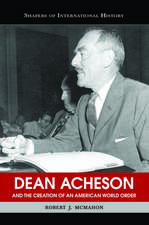Major Problems in the History of the Vietnam War: Documents and Essays
Editat de Robert J. McMahonen Limba Engleză Paperback – 31 aug 2007
Preț: 380.57 lei
Nou
Puncte Express: 571
Preț estimativ în valută:
72.82€ • 77.87$ • 60.72£
72.82€ • 77.87$ • 60.72£
Carte tipărită la comandă
Livrare economică 18 aprilie-02 mai
Preluare comenzi: 021 569.72.76
Specificații
ISBN-13: 9780618749379
ISBN-10: 0618749373
Pagini: 540
Dimensiuni: 169 x 232 x 21 mm
Greutate: 0.7 kg
Ediția:4 Rev ed.
Editura: HOUGHTON MIFFLIN
Locul publicării:United States
ISBN-10: 0618749373
Pagini: 540
Dimensiuni: 169 x 232 x 21 mm
Greutate: 0.7 kg
Ediția:4 Rev ed.
Editura: HOUGHTON MIFFLIN
Locul publicării:United States
Cuprins
Note: Each chapter concludes with Further Reading. Commonly Used Acronyms Map of Southeast Asia 1. Vietnam and America: An Introduction ESSAYS Michael H. Hunt, The Wages of War Michael Lind, The Necessary War Robert Mann, A Grand Delusion 2. French Colonial Rule and the Development of Vietnamese Nationalism DOCUMENTS 1. Jules Ferry Justifies French Colonial Expansion, 1884 2. Phan Boi Chau Resolves to Continue Fighting for Vietnam's Freedom, 1914 3. Ho Chi Minh Deplores "Imperialist Crimes," 1920 4. Ho Calls for Revolution, 1930 5. A Vietnamese Writer Recalls the 1944-1945 Famine, 1956 6. Vietnam Declares Independence, 1945 ESSAYS William J. Duiker, France's Imperial Dreams, Vietnam's Trauma Mark Philip Bradley, America's Symbolic Importance for Vietnamese Nationalists 3. The Roots of the American Commitment DOCUMENTS 1. George C. Marshall Expresses Concern About Indochina Dispute, 1947 2. Statement of U.S. Policy Toward Indochina, 1948 3. The United States Praises the Elysee Agreements, 1949 4. The State Department Recommends Military Aid to the French, 1950 5. The National Security Council Identifies Important U.S. Security Interests in Indochina, 1950 6. Dean Acheson Urges Aid for Indochina, 1950 7. Ho Chi Minh Denounces U.S. Intervention, 1950 ESSAYS Robert J. McMahon, Cold War Strategy and U.S. Intervention Mark Atwood Lawrence, The European Influence and America's Commitment to War in Vietnam 4. Dwight D. Eisenhower, Ngo Dinh Diem, and the Deepening U.S. Commitment DOCUMENTS 1. Dwight D. Eisenhower Appeals for British Help, 1954 2. Eisenhower Explains the Domino Theory, 1954 3. Vo Nguyen Giap Assesses Dienbienphu's Importance (1954), 1964 4. The Geneva Conference Signatories Issue Their Final Declaration, 1954 5. South Vietnam Renounces Negotiations with North Vietnam, 1955 6. Elbridge Durbrow Assesses the Diem Regime, 1957 8. Ngo Dinh Diem Pledges to Continue Fighting Communism, 1957 ESSAYS David L. Anderson, The Tragedy of U.S. Intervention Seth Jacobs, The Religious Roots of U.S. Support for Ngo Dinh Diem Gareth Porter, Exploiting U.S. Dominance 5. John F. Kennedy and Vietnam: Incremental Escalation DOCUMENTS 1. Maxwell Taylor Recommends the Dispatch of U.S. Forces, 1961 2. Dean Rusk and Robert S. McNamara Present an Alternative Plan, 1961 3. An Early U.S Army Adviser Remembers His Experiences (1962-1963), 1981 4. Mike Mansfield Questions American Policy, 1962 5. John F. Kennedy Criticizes the South Vietnamese Government, 1963 6. Kennedy Reaffirms the Domino Theory, 1963 7. Henry Cabot Lodge Discusses Coup Protests, 1963 8. McGeorge Bundy Expresses Reservations, 1963 9. Diem Makes a Desperate Appeal for U.S. Help, 1963 ESSAYS David Kaiser, Kennedy's Prudent and Cautious Policy Philip E. Catton, The Limits of U.S. Influence 6. Lyndon B. Johnson's Decisions for War DOCUMENTS 1. Robert S. McNamara Reassesses of U.S. Policy in South Vietnam, 1964 2. Lyndon Johnson and Richard Russell Ruminate about the U.S. Dilemma in Vietnam, 1964 3. The Tonkin Gulf Resolution, 1964 4. Lyndon B. Johnson Explains Why Americans Fight in Vietnam, 1965 5. McNamara Recommends Escalation, 1965 6. George Ball Dissents, 1965 7. Philip Caputo Remembers His Idealism (1965), 1977 ESSAYS Robert Dallek, Fear, Ambition, and Politics Fredrik Logevall, Choosing War 7. U.S. Military Strategy DOCUMENTS 1. Robert S. McNamara Urges Additional Troop Deployments, 1965 2. George F. Kennan Criticizes the American Military Commitment, 1966 3. William C. Westmoreland Reviews Military Operations in South Vietnam, 1966 4. The Central Intelligence Agency Critiques the Bombing Campaign, 1967 5. McNamara Sees an Improved Military Outlook, 1967 6. Westmoreland Defends the Attrition Strategy, 1977 7. Westmoreland Reflects on the Vietnam War's Meaning, 2003 ESSAYS Robert K. Brigham, An Unwinnable War John A. Nagl, The Failure of Counterinsurgency Warfare 8. Americans in Combat DOCUMENTS 1. A Cross-Generational Conversation About Joining the Army 2. "Dear Mom," 1966 3. Infantryman Salvador Gonzalez's Letter Home, 1969 4. A Soldier's Perspective on Combat in Vietnam, 1977 5. Herbert Carter Testifies About the My Lai Massacre, 1969 6. Varnado Simpson Testifies About the My Lai Massacre, 1969 7. Colin Powell Remembers His Two Tours of Duty in Vietnam, 1995 8. Robert Conner Reflects on His Vietnam Experience, 1993 ESSAYS Christian Appy, A Working Class War Gerard J. DeGroot, A Grunt's Life 9. The Enemy: North Vietnam and the National Liberation Front DOCUMENTS 1. Ho Chi Minh Rallies His Supporters After the Geneva Agreements, 1954 2. Truong Nhu Tang on the Origins of the National Liberation Front (1957-1959), 1985 3. The National Liberation Front Issues Its Manifesto, 1960 4. A Vietcong Recruit Explains Why He Joined the Revolution (1961), 1986 5. A South Vietnamese Peasant Girl Becomes a Vietcong Supporter (c. 1961), 1989 6. Vo Nguyen Giap Celebrates People's War, 1961 7. Nguyen Chi Thanh Outlines Communist Strategy, 1963 8. Ho Vows to "Fight Until Complete Victory," 1966 ESSAYS William J. Duiker, North Vietnam's Diplomatic Strategy Robert K. Brigham, The Role and Significance of the National Liberation Front 10. The Tet Offensive DOCUMENTS 1. The CIA Offers an Early Assessment of the Tet Offensive, 1968 2. A North Vietnamese Officer Reconstructs the Attack on a U.S. Marine Base (1968), 2003 3. Robert F. Kennedy Calls Vietnam an Unwinnable War, 1968 4. Walter Cronkite Criticizes a Policy "Mired in Stalemate," 1968 5. Senior U.S. Officials Weigh Policy Options, 1968 6. North Vietnam's Communist Party Evaluates the Successes and Failures of the Offensive, 1968 7. A U.S. Air Force Nurse Remembers the Tet Offensive (1968), 1987 8. Robert Komer Recalls Tet's Impact (1968), 1987 9. Clark M. Clifford Remembers His Post-Tet Questions (1968), 1969 10. Johnson Calls for Negotiations, 1968 ESSAYS Robert Buzzanco, A Crippling Defeat for the United States William Hammond, Tet and the Media 11. Richard M. Nixon's Strategy for Withdrawal DOCUMENTS 1. Henry A. Kissinger Reflects on the Nixon Administration's Dilemma in Vietnam (1969), 1979 2. Richard M. Nixon and Nguyen Van Thieu Discuss U.S.-South Vietnamese Relations, 1969 3. Nixon Warns About the Consequences of a U.S. Defeat in Vietnam, 1969 4. Nixon Appeals for Soviet Help in Ending the Vietnam War, 1969 5. A Guerrilla Leader Remembers 1969 as the "Worst Year" (1969), 1986 6. Nixon Advocates Vietnamization, 1969 7. Le Duc Tho Lectures Kissinger About North Vietnamese Determination, 1970 8. Nixon Justifies the Cambodian Incursion, 1970 9. Henry A. Kissinger Reveals the U.S. Negotiating Position, 1972 10. The Provisional Revolutionary Government States Its Negotiating Position, 1972 ESSAYS Melvin Small, Nixon's Flawed Search for Peace Lewis Sorley, A Better War 12. The Antiwar Movement and Public Opinion DOCUMENTS 1. Students for a Democratic Society Opposes the War, 1965 2. Martin Luther King, Jr., Declares His Opposition to the War, 1967 3. Women's Statement of Conscience, 1967 4. Proclamation of the Antidraft Resistance, 1967 5. A Popular Protest Song, 1967 6. James Fallows Reflects on the Draft's Inequities (1969), 1975 7. A Veteran Remembers His Bitter Homecoming, 1981 8. A Vietnam Veteran Opposes the War, 1971 ESSAYS Melvin Small, The Peace Movement on the Campuses Rhodri Jeffreys-Jones, Woman and Antiwar Activism Adam Garfinkle, Movement Myths 13. The Paris Peace Accords of 1973 and the Fall of South Vietnam DOCUMENTS 1. Richard M. Nixon and Henry A. Kissinger Discuss South Vietnam's Fate, 1972 2. Richard M. Nixon Reassures Nguyen Van Thieu, 1973 3. The Paris Peace Accords, 1973 4. Henry A. Kissinger Appeals to Congress for Emergency Aid, 1975 5. James R. Schlesinger, Jr., Recalls the Collapse of South Vietnam (1975), 1987 6. A South Vietnamese Pilot Reflects on His Country's Defeat (1975), 1990 7. A South Vietnamese Civilian Remembers His Last Days in Saigon (1975), 1990 8. A North Vietnamese General Celebrates the "Great Spring Victory" (1975), 1977 9. Nixon Blames Congress for the Fall of South Vietnam (1975), 1978 ESSAYS Larry Berman, The Betrayal of South Vietnam Pierre Asselin, A Doomed Agreement 14. International Dimensions of the War DOCUMENTS 1. French President Charles de Gaulle's Statement on Vietnam, 1963 2. Secretary of State Dean Rusk and French Ambassador Herve Alphand Discuss U.S.-French Differences over Vietnam Policy, 1964 3. The Johnson Administration Assesses the Attitudes of Allied and Nonaligned Nations, 1964 4. British Prime Minister Harold Wilson Warns President Lyndon B. Johnson about the Perils of Escalation, 1965 5. Canadian Prime Minister Lester B. Pearson Calls for a U.S. Bombing Halt, 1965 6. Mao Zedong Exhorts His North Vietnamese Allies, 1965 7. Australian Prime Minister Harold Holt Expresses Firm Support for U.S. Policy, 1966 8. Indian Prime Minister Indira Gandhi Declares That the Vietnam War Must End, 1966 9. Soviet Ambassador Anatoly Dobrynin Explains Moscow's Reaction to the North Vietnamese Offensive (1972), 1995 ESSAYS Frank Costigliola, The Vietnam War and the Challenges to American Power in Europe Qiang Zhai, China's Crucial Role 15. Legacies and Memories of a War DOCUMENTS 1. Gerald R. Ford on the Lessons of Vietnam, 1975 2. Jimmy Carter Sees a "Profound Moral Crisis," 1977 3. Ronald Reagan Calls Vietnam a Noble and Just Cause, 1988 4. An American Veteran Helps to Dedicate the Vietnam War Memorial (1982), 1985 5. An African-American Draftee Reflects on the War's Impact, 1984 6. A Former Army Nurse Considers the War's Impact, 1987 ESSAYS Paul Kennedy, The Impact of Vietnam on America's World Role Arnold R. Isaacs, Competing Memories Robert D. Schulzinger, Viewing Foreign and Military Policy Through the Prism of Vietnam















